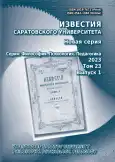Volume 23, Nº 1 (2023)
Articles
Buddhist ethics in the context of western normative ethical theories: Deontology
Resumo
 4-8
4-8


The Bible in the religious and philosophical works of N. S. Arseniev: Mystical experience
Resumo
The article traces the formation of the mystical experience of Nikolai Sergeevich Arseniev (1888–1977) on the basis of the memoir book “Gifts and Encounters of the Life Path” (1974), and the stages of his consideration of biblical studies. The analysis of Arseniev’s exegetical work “The Religious Experience of the Apostle Paul” (1935) is proposed. He was one of the Russian thinkers in whose writings the Holy Scripture occupied a central place, and almost all of his religious ideas grew out of New Testament books, and biblical concepts. As an exegete, he studied the problem of the Logos in the Gospel of John the Evangelist and the mystical experience of the Epistles of the Apostle Paul. The cross-cutting theme of Arseniev’s works was mysticism in ancient cults, the poetry of the Middle Ages, the works of the desert fathers, the texts of Russian and Western European ascetics of piety, religious philosophers (A. S. Khomyakov, I. V. Kireevsky, S. N.Trubetskoy, S. L.Frank) and biblical scholars. He relied on the mystical experience of the Church, the unity of Christians. In the Epistles of the Holy Apostle Paul, Arseniev emphasized the mysticism of life in Christ, Christian realism, the realism of the Cross of the Lord, and the realism of Resurrection. In general, the mystical experience of Paul, his preaching and activity, according to Arseniev, differs from “our usual experience” and is more real, since the apostle is “subdued”, “captured” by Christ, His fullness, and the grace of God.
 9-14
9-14


From humanism to post-humanism: Transformation of ideas of a man in philosophical thought
Resumo
 15-19
15-19


Healthy lifestyle: Philosophical dimension
Resumo
 20-24
20-24


Practical philosophy: Modern foundations and necessity
Resumo
 25-29
25-29


Genome editing and the status of the human embryo in vitro
Resumo
 30-34
30-34


Nostalgia for the USSR: Images of the Soviet era in the media and political practice of modern Russia
Resumo
 35-39
35-39


The dialectics of platformization
Resumo
 40-44
40-44


Religious-mystical experience and the psychoanalytic tradition
Resumo
 45-49
45-49


Reflexive representation of parental relationships as a determinant of adult temporality
Resumo
 50-55
50-55


Projective drawing tests in assessing the emotional attachment of women with schizophrenia to their family members
Resumo
 56-61
56-61


The relationship between the attitude to the disease and social perception in persons with hysterical neurosis
Resumo
 62-66
62-66


Socio-psychological and personal characteristics of the manifestation of workaholism
Resumo
 67-73
67-73


Some factors of subjective economic well-being
Resumo
 74-78
74-78


Psychological readiness of the NPP operational shift to work in emergency situations as a condition of its group reliability
Resumo
 79-84
79-84


The founder of the Saratov University psychological school S. L. Frank (on the occasion of 145th anniversary of the scientist)
Resumo
 85-93
85-93


Humor as an effective tool for teaching a foreign language at the university
Resumo
 94-98
94-98


Formation of the communicative competence of Russian and foreign electrical students during the socio-cultural project
Resumo
 99-103
99-103


Discussion competence in the structure of modern engineer training
Resumo
 104-110
104-110


Humanization of the continuity of modern society social reorganization on the basis of the idea of recreating the USSR in the students' mind
Resumo
 111-115
111-115


E. Demolins' concept of pedagogy in the context of the reform movement “New Education”
Resumo
 116-120
116-120











